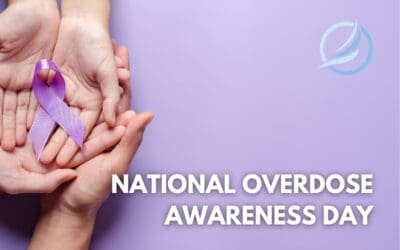Benzodiazepines are a class of drug that slows down brain and nervous system activity, which makes them an effective counter to anxiety and other conditions such as insomnia and epilepsy.
But despite its effectiveness, benzodiazepines are also known for their high potential to create dependence and addiction, potentially leading some people with anxiety down the path of substance abuse.
This article will explore the side effects of benzodiazepines and the alternatives to their use, from other, less addictive medications to psychotherapy and lifestyle changes.
The Role of Benzodiazepines in Anxiety Treatment
Due to their depressant effects on the central nervous system (CNS), benzodiazepines play a crucial role in treating anxiety, sleep disorders, spasms, and epilepsy. They work by enhancing the effect of the neurotransmitter gamma-aminobutyric acid (GABA) in the brain, which reduces neuronal excitability and provides a calming effect, offering rapid relief from acute anxiety symptoms.
However, benzodiazepines vary in potency. For example, triazolam (Halcion), clonazepam (Klonopin), lorazepam (Ativan), and alprazolam (Xanax) are typically considered the strongest in the class. People sometimes compare benzodiazepines to barbiturates, which doctors previously prescribed for anxiety. However, because benzodiazepines are safer than barbiturates, they have become the preferred treatment for anxiety.
As we’ll see, their high effectiveness and potency can lead to potential risks and side effects.
Side Effects of Benzodiazepines
Benzodiazepines can cause a range of side effects, some of which might be mild, while others can be more severe:
- Drowsiness
- Dizziness
- Confusion
- Disorientation
- Impaired coordination
- Slowed reflexes
- Blurred vision
- Mood swings
- Memory problems
Risks Associated with Benzodiazepines
The risks of benzodiazepine use are substantial and require cautious management:
- Dependence and withdrawal
- Tolerance
- Overdose
- Rebound anxiety
- Cognitive decline
Long-Term Health Concerns
Extended use of benzodiazepines increases the risk of several long-term health concerns:
- Increased Risk of Dementia: Some studies suggest a link between long-term use of benzodiazepines and an increased risk of dementia.
- Potential for Affective Disorders: Long-term use may be associated with the development of depressive or affective disorders.
Alternatives to Benzodiazepines for Anxiety Relief
Given the potential risks and addiction potential of benzodiazepines, healthcare professionals sometimes turn to alternative classes of medications, such as Selective Serotonin Reuptake Inhibitors (SSRIs) and Serotonin-Norepinephrine Reuptake Inhibitors (SNRIs).
These medications offer a different approach to managing anxiety disorders, focusing on the long-term regulation of mood and anxiety symptoms rather than the immediate relief provided by benzodiazepines.
SSRIs and SNRIs
SSRIs, including fluoxetine (Prozac), sertraline (Zoloft), and escitalopram (Lexapro), boost serotonin levels in the brain. Serotonin is a neurotransmitter that influences mood and social behavior. SSRIs block the reabsorption (reuptake) of serotonin into neurons, enhancing mood and effectiveness in treating various anxiety disorders such as Generalized Anxiety Disorder (GAD), panic disorder, and social anxiety disorder.
Similarly, SNRIs like venlafaxine (Effexor) and duloxetine (Cymbalta) also target serotonin but extend their action to include norepinephrine, which is involved in alertness, energy, and mood regulation. This dual action makes SNRIs particularly useful for treating anxiety disorders.
Compared to benzodiazepines, SSRIs and SNRIs offer long-term anxiety management with a lower risk of dependence and withdrawal. Because of this, many professionals consider them first-line treatments for many anxiety disorders.
However, these medications are not without side effects. Common ones include nausea, headaches, dry mouth, and sexual dysfunction. Moreover, they generally take several weeks to alleviate anxiety, which makes them less effective for immediate relief from panic attacks.
Ultimately, the decision to use SSRIs or SNRIs should be made in collaboration with a healthcare provider, considering each option’s benefits and potential side effects.
Cognitive-behavioral therapy (CBT)
Cognitive-behavioral therapy (CBT) is a highly effective, evidence-based psychotherapy for anxiety disorders (and several other conditions). It works by identifying and challenging negative thought patterns and behaviors that contribute to anxiety.
To overcome them, CBT helps individuals develop healthier thinking patterns and coping mechanisms, empowering them to manage their anxiety more effectively.
The structured nature of CBT makes it a versatile treatment option, suitable for individual or group therapy settings and can have long-lasting benefits for various anxiety disorders.
Mindfulness
Meditation, yoga, and deep-breathing exercises help people cultivate present-moment awareness, letting them observe their thoughts and feelings without judgment. This can reduce the impact of anxiety-inducing thoughts and promote a sense of calm and relaxation. Mindfulness practices have not only helped relieve symptoms of anxiety but also improved overall emotional regulation and resilience.
Lifestyle changes
Lifestyle changes are also crucial in anxiety management. Regular physical activity, a balanced diet, adequate sleep, and reducing or eliminating stimulants (like caffeine and nicotine) can significantly impact anxiety levels.
Exercise, for instance, releases endorphins, natural mood lifters that can also reduce stress. Similarly, a diet rich in omega-3 fatty acids, antioxidants, and vitamins can help to lower anxiety levels.
Furthermore, adequate sleep and stress management techniques, such as time management and setting realistic goals, further support mental health and well-being.
There Are Alternatives to Benzodiazepines in Anxiety Treatment
Benzodiazepines are very effective anti-anxiety medications that, nonetheless, can become risky if taken at higher concentrations than prescribed, for more extended periods than recommended (more than two weeks), or in combination with other depressants like alcohol.
As a result, many people with anxiety and medical professionals seek alternatives like SSRIs and SNRIs, which provide a longer-term solution with a lower risk of dependence and addiction. However, they still have some side effects.
The pros and cons of each medication emphasize the importance of seeking professional help for anxiety and working with healthcare professionals to make informed decisions about anxiety treatment.
In addition to medications, healthcare providers should offer more comprehensive approaches involving psychotherapy and support for lifestyle changes. With a combination of pharmaceutical treatment, therapy, and lifestyle adjustments, it’s possible to manage and overcome anxiety in the long term.

































